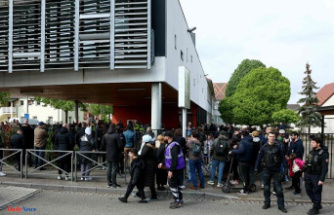Concern about how to get through the next heating season is growing. The impending gas shortage scares homeowners in particular. And the corresponding bills. What consumers can do now.
Heating doesn't matter. However, what will change in the next few weeks and has long been an issue in people's minds. Because we are in an energy crisis. Owners of gas heaters in particular are concerned about the winter. Changing the type of heating quickly is extremely difficult. But there are other steps you can take as a heater owner.
How can my heating work more efficiently?
1. Professional cleaning: In many cases this is possible. According to the "Intelligent heating" guidelines from the VdZ - the Economic Association for Buildings and Energy, a layer of soot of just one millimeter increases energy consumption by up to five percent. According to the Central Association for Sanitary, Heating and Air Conditioning, the costs depend on the device type, the age of the system and the scope of the inspection services. Co2online gives the average maintenance costs at around 160 euros.
2. Hydraulic balancing: The aim here is to let the optimum amount of water run through the radiators. In this way, the heating system is better adjusted to the living space. According to experts, the energy consumption for heating radiators can be reduced by up to 15 percent through hydraulic balancing.
Problem: The trade is currently very busy, appointments with a specialist are difficult to get.
Can I do something myself?
1. Install insulation: You can insulate exposed and uninsulated heating pipes and valves in unheated rooms such as the basement. In this way, less energy is lost on the way to the living space. This is easy to do by putting insulating shells over the pipes. According to the consumer advice center in North Rhine-Westphalia, up to 200 kilowatt hours of energy can be saved per meter of pipe, and the cost is between three and ten euros per meter for insulating material from the hardware store. By the way: The insulation of the heating pipes, lines and fittings in unheated rooms is even mandatory according to the Building Energy Act of 2020.
Savings potential: According to the North Rhine-Westphalia consumer advice center, up to 200 kilowatt hours of energy per meter of pipe can be used in unheated areas for living spaces that would otherwise be lost on the way there. The consumer advocates explain in a video on YouTube how it works.
Costs: Pipe insulation plus glue and insulating tape are available for three to ten euros per meter in hardware stores.
Extra tip: In older buildings, especially in buildings from the 1960s and 70s, the niches for the radiators can still be uninsulated. According to calculations by the North Rhine-Westphalia Consumer Advice Center, up to 15 euros of heat can be wasted per square meter per year. Insulation boards and mats are a solution, they are airtight on the wall. Aluminum lamination can be attached to this, which should also help to save money.
2. Save energy in the household: You can switch older heating systems to summer mode and reduce daily energy consumption when cooking, washing or showering. It is often only small amounts of energy and amounts that can be saved with each individual measure.
Savings potential: Several hundred euros per year possible.
3. Venting at the next start of heating
You should remember this savings tip until the next time you turn on your radiators. If these are not really warm, especially in the upper area, there is air in the lines. She has to go. Gurgling noises are also a sign of this.
This is how it works in a nutshell: When venting, the valve on the side of the radiator is opened with a square wrench and left open until only water comes out. The DIY Academy advises that only a little water can escape. Otherwise you may have to refill some of the system.
More detailed instructions can be found under "Intelligent heating"; the DIY Academy also explains how to refill heating water.
Savings potential According to Co2online, venting can save around 60 euros in gas in a 110 square meter single-family house, for example, and around 30 euros in a 70 square meter apartment in an apartment building.
Costs: Simple square keys are available online or in hardware stores for less than two euros.
Solar system, pellet stove, heat pump: Can I quickly replace my gas heating?
Changing or adding a gas heating system is a measure that frees you from skyrocketing costs and fears of supply in the medium to long term, but it needs sufficient advance notice.
The waiting times for stove builders are sometimes a year, sometimes due to delivery problems. "When the war broke out, demand exploded," said a spokesman for the Central Association for Sanitary, Heating and Air Conditioning (ZVSHK) in early July. According to reports, the manufacturers can hardly keep up here.
Switching to another energy source or supplementing the existing oil and gas heating system, for example with a pellet stove or a solar system, requires adequate planning and often additional work. Apart from that, the cost of pellets has also more than tripled.
Let's take the heat pump as an example: According to the Zukunft Altbau program, most older buildings first have to be made fit for a heat pump. Depending on the condition, the insulation of the roof, facade, windows or basement ceiling must be improved or surface heating must be used.
What about alternatives?
Devices with names such as auxiliary, electric or direct heating as well as radiators, fan heaters or convectors are currently being bought. They work with heating resistors that heat up when current flows.
In some older bathrooms there is only this electrical heating variant - for example as a permanently installed radiant heater or as a mobile device. However, these electric heaters usually have a very high power consumption, and that is also only expensive to have.












